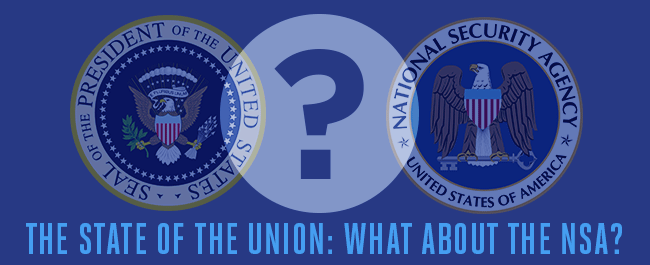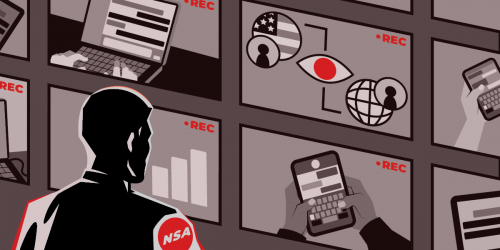
The President’s State of the Union address examined a great many pressing issues confronting our nation and the world. One of the most dire, however, somehow escaped his attention: the continuing threat to democracy presented by unaccountable, secret mass surveillance in violation of the Constitution.
The President’s promise to rethink security policies hastily adopted under his predecessor was a significant part of his platform when he ran for the White House. During his first presidential campaign back in 2008, President Obama made a written promise to:
conduct a comprehensive review of all our surveillance programs, and to make further recommendations on any steps needed to preserve civil liberties and to prevent executive branch abuse in the future.
But even after the Snowden revelations, mass surveillance by the National Security Agency remains largely unchecked. With a year remaining in its final term, the Obama administration has failed to implement the wide-ranging reforms necessary, as the President eight years ago promised in writing, "to preserve civil liberties and to prevent executive branch abuse in the future."
Even after the Snowden revelations, NSA mass surveillance remains largely unchecked.
On the one hand, President Obama did order a review of signal intelligence programs soon after he entered office, and then convened a Review Group on Global Signals Intelligence after the Snowden revelations in 2013. It produced a 300 page report that deeply explored the issues and made 46 specific recommendations. The review group’s proposed reforms were impressive, but they left much to be desired and, in any case, only a minuscule fraction have found their way into policy.
Meanwhile, during President Obama’s tenure, the Justice Department has continued to respond to court challenges asserting the privacy rights of Americans—including cases filed by EFF—with delay and obfuscation, avoiding judicial review on the merits and hiding behind essentially lawless claims of unfettered executive secrecy.
The administration's claims in court, alongside its unprecedented and relentless persecution of journalists and government whistleblowers who risk their careers to empower the public, fly in the face of the transparency to which the president has repeatedly recommitted himself and his administration.
In 2013, the nation's top intelligence official offered false statements in response to direct congressional questions about whether millions of Americans are being monitored by our government. Despite being discredited by the Snowden revelations, James Clapper continues to enjoy the President's confidence and to serve in the administration.
To his credit, President Obama supported an initial set of important yet incomplete reforms enacted into law last year. It was the first time in 40 years that Congress had moved to restrain recurring—and ongoing—domestic abuses by our nation’s intelligence agencies.
If America is to truly be a land of the free, Congress must continue to explore what the executive branch has refused to reveal, reform the broken classification system, and then go beyond transparency to impose meaningful protections for privacy, dissent, and civil liberties. Having recently learned that their own communications were subjected to lawless government monitoring, perhaps members of Congress will see fit in 2016 to finally ask the questions that no one has yet answered in public.







